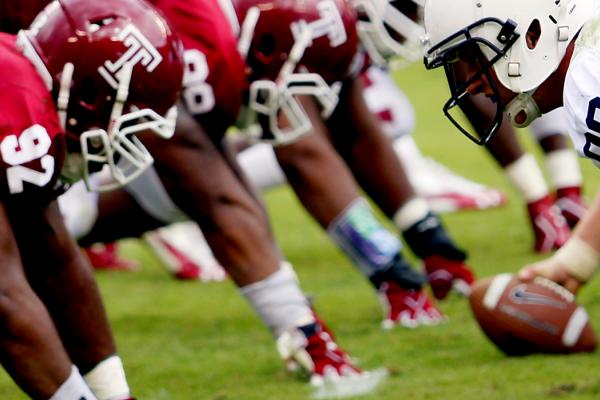I GREW UP dazzled by NBA champion Kobe Bryant taking over games and redefining precision—I could never look away when he was on the court. But the sexual assault accusations brought against him in 2003 are as much a part of Bryant’s legacy as the night he dropped 81 points on the Toronto Raptors.
Domestic violence and sexual assault cast a long shadow over athletics, as much in Christian colleges as in secular universities or professional sports. Christian colleges should be held to a higher standard, however, because they have a gospel mission to shape disciples and protect the vulnerable, not just trade in talent.
That’s why I was dismayed in November when Liberty University (“Training Champions for Christ since 1971”) hired Ian McCaw as its new athletic director. McCaw resigned from Baylor University last year after he was sanctioned and placed on probation for his role in a widespread sexual assault scandal. The investigation into McCaw’s negligence led an independent law firm to release “scathing findings” of an “overall perception that football was above the rules,” and a complete lack of a “culture of accountability for misconduct.”
Liberty President Jerry Falwell Jr.’s response? McCaw’s tenure at Baylor “fits perfectly with where we see our sports programs going.”
Professional sports are notorious for an institutional failure to hold sports figures accountable and to believe, respect, and protect victims of physical and sexual violence by those same figures. The NFL famously prioritizes player talent over women’s safety and imposes punishment to offenders unevenly—an inconsistency that often has a racialized narrative.
Teams and scouts often overlook players’ histories of violence if they show athletic promise. Commentators refer only to “off-the-field issues,” as if assaulting a woman were the same as speeding. If you promote a violent game, don’t sanitize the overflow of that violence.
Like the military (and in some cases, the church), sports institutions often rely on internal “discipline” to handle allegations of physical or sexual abuse.
In Baylor’s case, the independent review found “the football program’s separate system of internal discipline ... improperly insulates football players from appropriate disciplinary consequences,” putting students “at risk of future misconduct.”
Often “internal discipline” translates as “mentorship.” Former Dallas Cowboy and outspoken evangelical Michael Irvin, for example, actively mentors players who have, as Cowboys owner Jerry Jones puts it, “a unique set of circumstances” (meaning a history of violence). Irvin draws a distinction between “wickedness” and “weakness” in athletes; many criminal offenses they commit, in his view, are not a product of the same “wicked” nature that caused former New England Patriot Aaron Hernandez to commit murder, but rather result from personal “weakness”—lapses in character.
But Irvin, Jones, and NFL commissioner Roger Goodell increasingly blur the line between “wicked” and “weak,” too often explaining away violence against women as personal weakness to be fixed “relationally” instead of institutionally.
A solely relational approach to combating violence against women will consistently fall short, in the same way that “a lot of the pastoral counseling” in situations of domestic abuse “is more hurtful than helpful because so many pastors have wanted to preserve the marriage at all costs,” as Rev. Bob Owens observes. Many clergy members hesitate to take practical steps to ensure women’s safety.
The “It’s On Us” campaign teaches student athletes to take the lead in ending campus assaults. The Drake Group focuses on protecting student athletes from the “corrosive aspects of commercialized college sports” and provides effective policies that schools can adopt. Building on efforts like these, Christian institutions must create a culture in which sinful abuse is combated systematically and violence is unacceptable.

Got something to say about what you're reading? We value your feedback!

